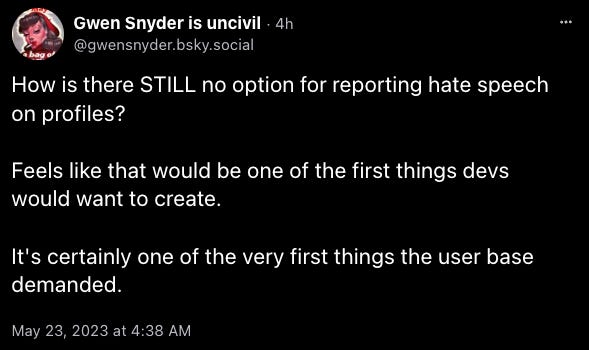Bluesky might be the open source world's latest attempt at replacing the dumpster fire that is now Twitter, but the small, scrappy founding team is not immune to the perpetual challenges of moderation, trust, and safety that every social platform encounters. The question is: how much hope should we have that this grassroots organization will get it right where others have so dramatically failed to protect their most vulnerable members?
Bluesky is currently in an invite-only beta phase, which has managed to foster a fairly inclusive and pleasant example of what an online community could be if only people would stick to sexy Alf memes and late night thirst traps, avoiding the whataboutism and outright hate-mongering that now seems to be what remains in the Twitter hellscape.
Unironically backed by Twitter founder, Jack Dorsey, CEO Jay Graber and her team have managed to manually deflect the few problematic individuals who have infiltrated the social barrier of their time-limited invite system.
Psst...here's Jay Graber's take on moderation in bsky>>>
As the small and scrappy team behind the platform grapples with the presence of the few bad actors (I'm referring to actual Nazis and not Jimmy Kimmel in this instance, but yes, him too), the Bluesky user base questions whether the team will be able to construct and implement the necessary policies and mechanisms to protect vulnerable communities, who have a long-standing complaint about Twitter's overall failure to do so.
New features are emerging from the Bluesky team each week, which you can follow in their public GitHub repo.
So, what can we learn from this experiment?
Well, here's what I see the Bluesky team doing well:
Involve your users early and often
Build the culture you want in your platform by inviting the right users early on
Grow the platform in a controlled manner by giving members a slow trickle of invites to extend to their network
Seek feedback proactively and act on it quickly
Build in public with transparency
Don't rush through beta without ensuring that the build is actually viable
What I can see them stumbling through:
Prioritize safety over fun features
Proactively build a formal code of conduct in partnership with your early adopters
Empower the community to enforce the rules through appropriate moderation tools and reporting mechanisms
Discover what experts are already in your community and elicit their help in developing your policies and tools
Fortunately, the Bluesky team has been smart to give access to some of the top developers on the platform like Paul Frazee, who posts a fun mix of quirky nonsense and responses to bug reports and product feedback. This gives members a feeling of personal connection with the Bluesky team and helps them feel heard, even when this small team isn't able to immediately deliver technical fixes or policy changes.
The team also set up a domain (@bsky.team) early on that was specific to their team members, making it easy for users to find the right person or people to talk to about particular issues or ideas they had with the platform. CEO Jay Graber is also very actively using the app to provide a human-centric view of policy and strategic decisions being made by the team. Again, this gives members the feeling of shared ownership and influence over the future of the app. And by simply practicing inclusive behaviors, like including pronouns in their profiles, the team is modeling the kind of culture they are seeking to establish as the standard in this space.
I think this is a great opportunity for a group of very smart people to build something extraordinary - the evolution of Twitter into a powerful, decentralized forum for people around the world to share ideas and funny memes, without the threat of an evil overlord deciding to invade the empire to serve an individual political agenda. It's possible that Bluesky will fizzle out the way that Mastodon has for the most part, but I am optimistic that this could become the next hot channel for social engagement for individuals and brands alike.
What do you think? Will Bluesky eventually fill the void left by Twitter?
Stay salty, friends.









